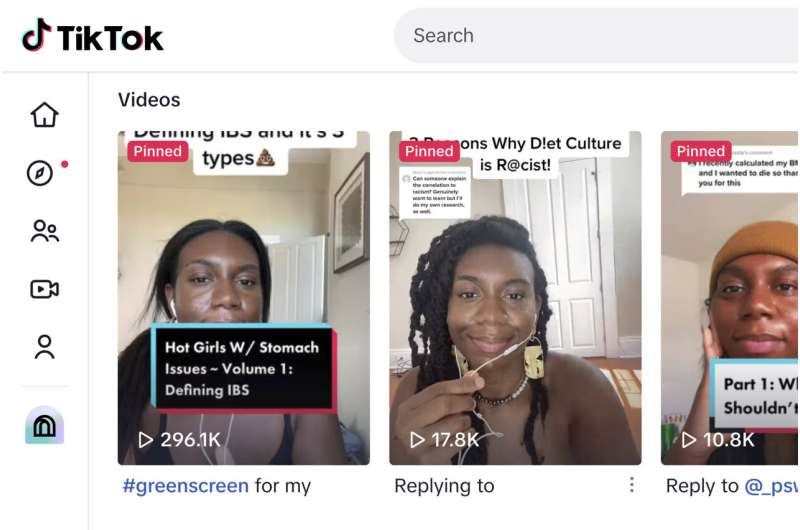
This Thursday, August 1, 2024, the image shows some of Lauren Bell’s videos on the TikTok social media website. Bell, who occasionally takes over-the-counter medications to manage her symptoms, first started posting on Instagram about her struggles with IBS — how isolating it was and how she felt like she had to adjust her life and diet to accommodate her food sensitivities — and sharing her diagnosis with her friends Credit: AP Photo
Are you spending more time in the bathroom than you’d like? The many TikTok posts show that you’re not alone.
Young people, especially women, are increasingly talking about gastrointestinal issues like irritable bowel syndrome or chronic bloating on social media. Some experts say that’s a good thing, because it can help others seek help for a taboo topic.
But they stress that it is important to realize that many people are paid to promote sometimes unproven products and that there is a lot of misinformation out there. Here is what else medical professionals recommend you do if you suffer from digestive problems.
Why are young people increasingly talking about digestive problems online?
It’s unclear whether there’s been an increase in digestive problems in general, with some experts attributing the trend to a rise in post-pandemic anxiety in an already anxious generation.
Extensive research and science shows that our brains and guts are connected via nervous systems. This means that when your brain is anxious or you are feeling depressed, it can pass those signals on to your gut, which can make it harder for your GI tract to function properly.
The causes of irritable bowel syndrome are unknown, but experts say the nervous system plays a major role in the condition and that stress can worsen symptoms.
Dr. Nina Gupta, a Chicago-based gastroenterologist, says treating her patients’ conditions often involves treating their mental health as well.
When should you see a doctor?
It depends on the level of discomfort, said Dr. Uma Naidoo, director of nutritional and lifestyle psychiatry at Massachusetts General Hospital, who studies the connection between food and the brain.
She said sudden changes in bowel movements are concerning and may require further investigation.
“For example, someone who has had no digestive problems as a child or throughout their life and then suddenly has a very severe and significant change in their bowel movements,” she said. “These are all things we want to talk to someone about with their doctor.”
And if you see blood in your stool—regardless of the amount or frequency—or if you have persistent diarrhea for more than a few weeks, seek immediate medical attention.
What can I do to relieve indigestion?
Naidoo said some mindfulness practices like stress management, meditation and breathing exercises can help. Food sensitivities can trigger IBS symptoms, so changing your diet and exercising more can also make a difference.
“Just doing something like finding a good probiotic that they’re taking, or slowly and steadily adding probiotics and fermented foods into their diet can be good,” she said. “Stress management is a big part of that. Coupled with dietary modification, it can be really powerful.”
However, if symptoms worsen or cannot be controlled at home, it is a sign that you should seek professional help.
© 2024 The Associated Press. All rights reserved. This material may not be published, broadcast, rewritten or redistributed without permission.
Quote: IBS and digestive issues in the spotlight on social media. Here’s what you need to know (2024, August 4) Retrieved August 5, 2024 from https://medicalxpress.com/news/2024-08-ibs-digestive-spotlight-social-media.html
This document is subject to copyright. Except for fair dealing for private study or research, no part may be reproduced without written permission. The contents are supplied for information purposes only.
 Healthy Famz Healthy Family News essential tips for a healthy family. Explore practical advice to keep your family happy and healthy.
Healthy Famz Healthy Family News essential tips for a healthy family. Explore practical advice to keep your family happy and healthy.


